Message from the Board Chair
Building better mental health care for children and youth
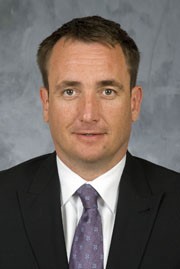
It has been an exciting three years since SickKids integrated with the former Hincks-Dellcrest Centre to form SickKids Centre for Community Mental Health (CCMH). Mental health continues to be a key strategic priority for the SickKids enterprise. As such, SickKids CCMH continues to grow their service capacity for mental health care for children and youth. A measurement-driven organization, SickKids CCMH collects data on how long it takes for a client to move through various phases of the treatment process, and to measure the effectiveness of treatment received. This has led to a constant evolution of service delivery models, tailor-made to the clients in the communities we serve. SickKids CCMH Learning Institute is also evolving their training course offerings based on the mental health needs for children and youth that professionals see in the community.
A goal of SickKids, SickKids CCMH and SickKids CCMH Learning Institute since integration in February of 2017 has been to develop seamless mental health service between the hospital and the community, enhancing quality and improving the experience of clients and families. The role SickKids CCMH and SickKids CCMH Learning Institute play is vital, delivering 34,035 treatment and assessments in the community and training over 2,400 professionals this past year alone, respectfully. At SickKids, SickKids CCMH, and SickKids CCMH Learning Institute, we are constantly looking for ways to collaborate to enhance access to care.
I invite you to read the letters below from our leaders, and the featured stories, to get a sense of how this work evolves, always with the goal of providing high-quality mental health care and training. The Centre and Learning Institute leadership are rightly proud of the work that is being done, promoting excellence year over year.
I am grateful to former Board Chair Marilyn Monk for guiding us through the initial stages of the integration, and I am honoured to assume the role. I look forward to continuing the work of the Board and its ongoing work with Dr. Ronni Cohn, President and CEO of SickKids, Chris Bartha, Executive Director of SickKids CCMH and Pam Hubley, the Lead Executive of the SickKids CCMH Learning Institute. Together, we will build better mental health care for our children and youth.
Jeff Mainland
Chair, Board of Trustees
SickKids Centre for Community Mental Health
For the SickKids Centre for Community Mental Health Board
Message from the Executive Director, SickKids CCMH
Innovating for our clients and families
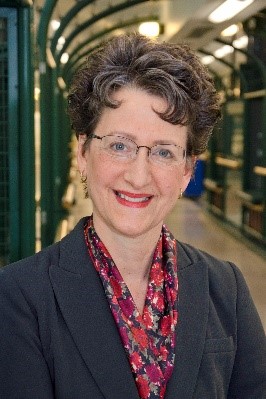
This past fiscal year has been an exciting and productive period of both planned and unplanned innovations, all with the goal of improving access to high quality mental health care at SickKids CCMH. Our goal remains the delivery of the highest quality services to the children youth and families in our city and across our province.
As part of a multi-year agenda focused on improved quality and access, we continued with our planned transformation of our Intensive Services for Youth. With the closing of our rural property and expansion of city-based services, this redesign now better reflects the needs and input of the youth we serve. By adding an additional day treatment classroom at our Jarvis location, we expanded capacity by 25 per cent with further growth planned in the coming year. A cornerstone of our services are the intensive outpatient therapies for complex mental health issues; since the integration, wait times for these services have declined by 60 per cent, the result of teams collaborating to deliver better evidence-based approaches combined with more efficient models. We continue to work with SickKids and our community partners towards building a seamless, connected, children’s mental health sector.
Our unplanned innovations were the result of responding to the global pandemic, COVID-19, an unprecedented event that has impacted every sector since March of 2020. Out of necessity and a commitment to support client care, our leaders and staff quickly adopted new approaches to virtual and online care, delivered from home offices. Through redesign and ingenuity, SickKids CCMH maintained 90 per cent of our services on virtual platforms – while our buildings were closed, our agency remained open. This dramatic event has changed our perspective on our future service models and accelerated our long-term service strategy which now includes a more robust hybrid model that leverages online care where it works, and maintains in-person support when this best meets the needs of our children, youth and families. I invite you to read more about the accomplishments of this year in the highlights below.
It would be an understatement to say that I am proud of what the leadership and staff of SickKids CCMH have accomplished this year. Thank you for all that you do in supporting each other and our clients. To our Board, thank you for your continued support of this important, life-changing work. To our clients and families, thank you for entrusting us with your care.
Christina Bartha
Executive Director
Brain and Mental Health Program, SickKids
and SickKids Centre for Community Mental Health
For the Senior Leadership Team, SickKids Centre for Community Mental Health
Message from the Lead Executive, SickKids CCMH Learning Institute
Building capacity in community professionals to enhance mental health supports for children, youth and adults
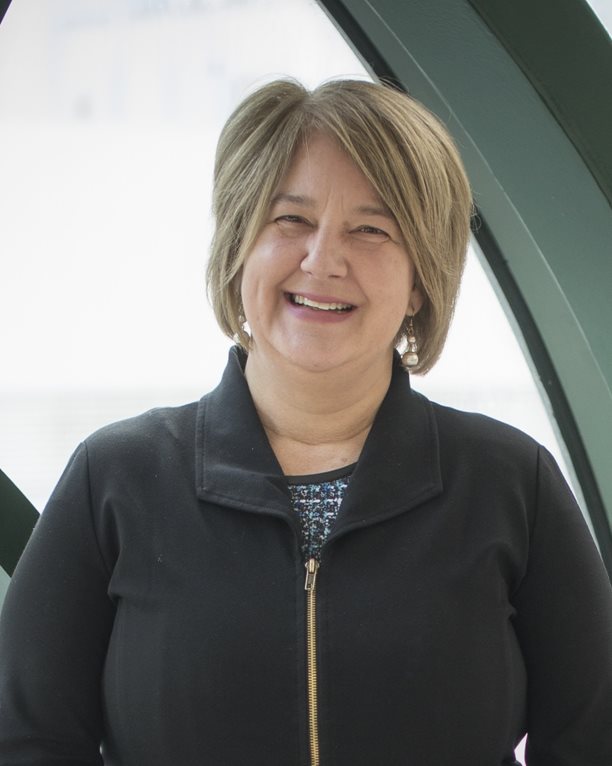
At SickKids CCMH Learning Institute, we continue to develop courses to meet the training needs of professionals in our community. Over the past year, we have offered training to over 2,400 professionals in 16 occupational categories, including social workers, psychotherapists, child and youth care workers and occupational therapists. Our SickKids CCMH Learning Institute Advisory Board, populated by our key community partners, have provided invaluable insight into what training is needed across the mental health space for professionals working with children, youth and adults. This year, SickKids CCMH Learning Institute delivered 75 courses and added 11 new course topics to its curriculum.
A continuing strategic direction of the SickKids CCMH Learning Institute is to enhance learning technologies. This spring, in response to COVID-19, many of our in-class training sessions were quickly converted to webinars, accelerating our schedule for offering courses virtually. Thanks to the innovation and flexibility of our team and our facilitators, 75 per cent of our courses pivoted to this virtual format. This is a significant accomplishment and allowed professionals to continue their training, thus meeting needs for their many clients who were dealing with the unprecedented mental health impact of a global pandemic.
I look forward to the numerous opportunities to increase the reach of the SickKids CCMH Learning Institute as we innovate and develop new training models, now and into a post-pandemic future.
Pam Hubley
Vice President Education & Academic Practice, SickKids
Lead Executive, SickKids CCMH Learning Institute
SickKids Mental Health at a glance 2019-20
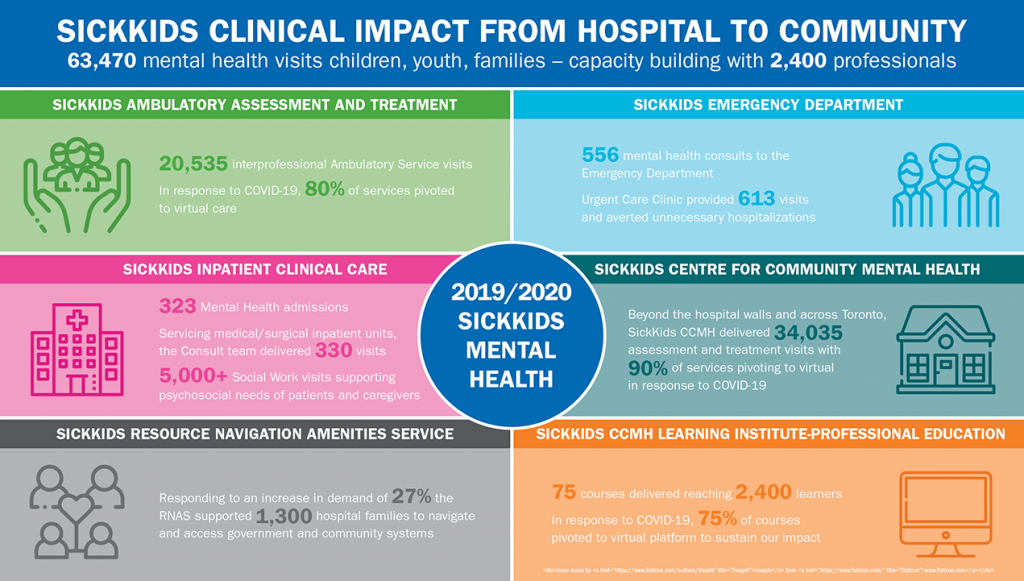
Highlights from a year of innovation
Meeting the needs of the communities we serve
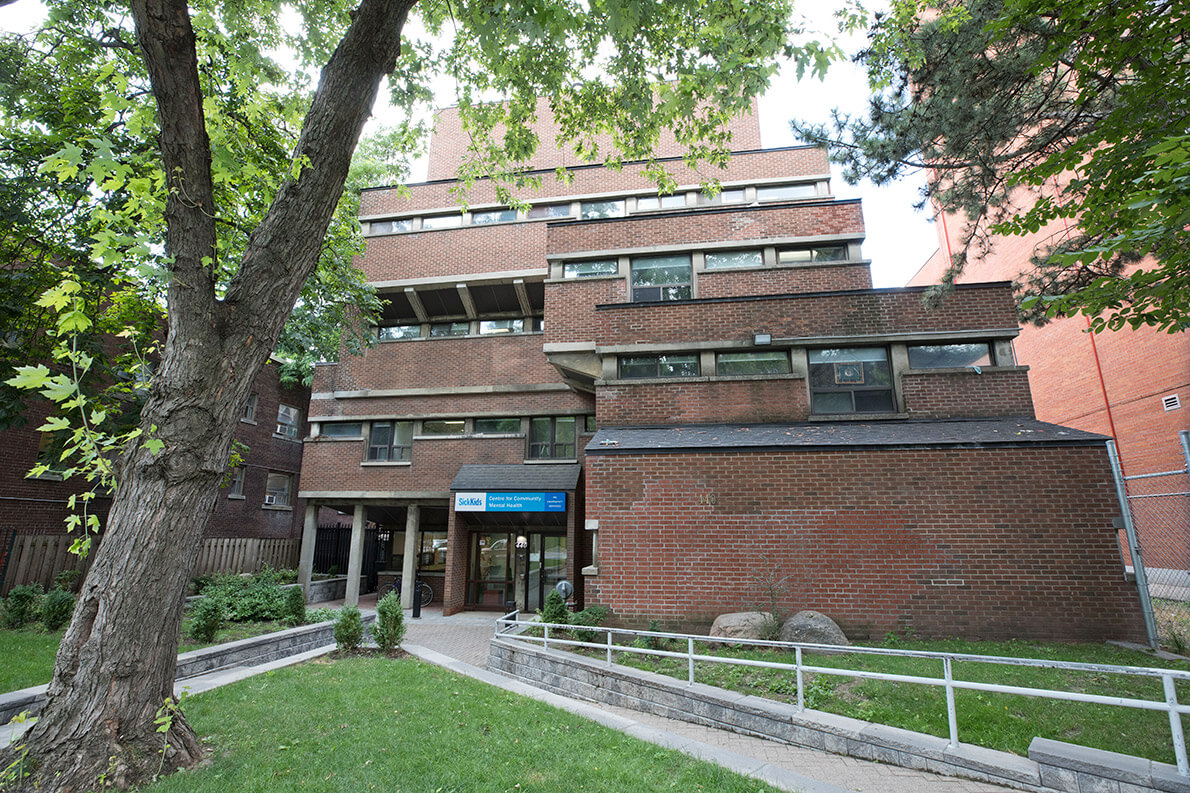
By Neill Carson, Clinical Director and Site Lead
Since the integration with SickKids, SickKids CCMH has focused on increasing service capacity, reducing waits and developing evidence-based treatments and approaches to meet the needs of a changing client population. I am tremendously proud of what leadership and staff achieved this year in pursuit of these goals.
- Increased capacity in our Intensive Services for Youth program, as restructuring resulted in the addition of a new classroom located at Jarvis Collegiate Institute and a 25 per cent increase in overall service capacity. A special thanks to our TDSB partners for their hard work in delivering the new class a year earlier than planned!
- Increased capacity to provide day-based service and to respond to clients in their own community due to an investment in expanded day-based treatment and community intensive services.
- Created continuity between family, home, community and classroom in our Intensive Services for Younger Children program, after integration of the day treatment team with the in-home services team resulted in a more cohesive and integrated approach to treatment.
- Reduced wait times for service and increased capacity for intensive family intervention after new service models were introduced in our Outpatient services (supported by staff training).
- Provided Families First education workshops, made possible by a collaboration between our Outpatient staff and our Prevention and Early Intervention staff, who provided workshops to 270 families on the waitlist and in the general community.
- Improved interprofessional collaboration across all programs through training and clarification of scopes of practice. All our main service teams now include both psychiatry and psychology.
- Ensured incoming clients have access to the full spectrum of services we offer regardless of the initial referral question, thanks to the work of a single interprofessional intake team which reviews complex cases.
- Increased program capacity at our EarlyON centre at the Sheppard site, made possible by funding from the City of Toronto which helped us complete a major renovation.
We continue to plan – and respond – to our clients and communities to provide the care they need.
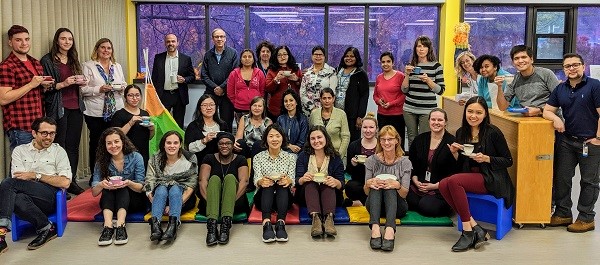
Rapid advance into virtual care in response to COVID-19
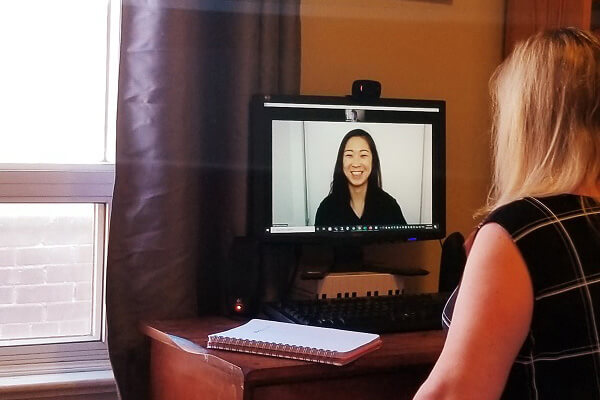
On March 11, 2020 the World Health Organization declared a global pandemic. The two locations of SickKids CCMH transitioned to a work-from-home model to curb the spread and minimize risk to clients, families and staff. With remote access quickly set up, videoconferencing platforms soon followed, with 90 per cent of services pivoting to a virtual response. These platforms are still in use in every department at SickKids CCMH even as in-person services resume.
See full story.
Decreasing wait times, increasing support for families waiting for service
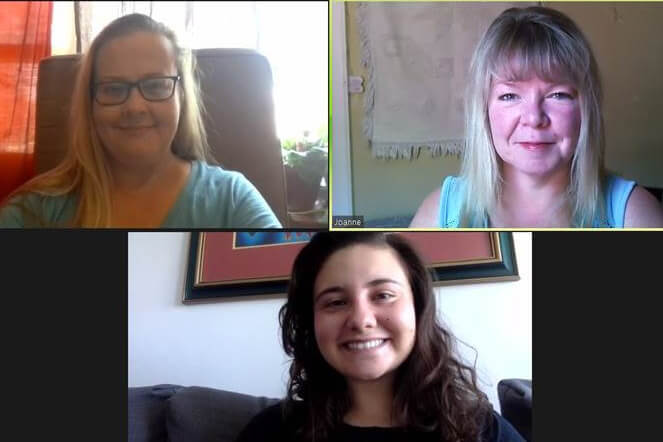
SickKids CCMH continues to reduce waiting times for clients, year over year. There has been a 45 per cent reduction in wait time to first service since last fiscal year (see below).
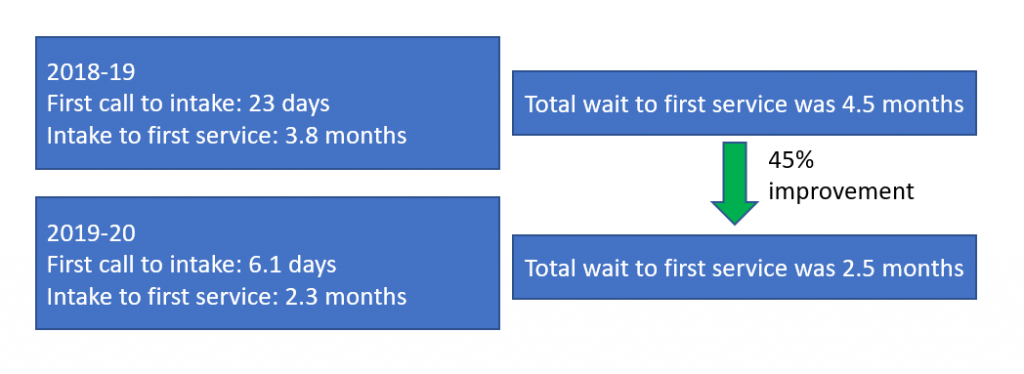
These improved wait times reflect more streamlined intake processes and the diversification of our service offerings to include single session and brief services. These changes have also improved our readiness to provide intensive individual and family therapy and reduced the waits for these services as well. Families on the wait list are also offered Families First workshops, offering support from concerns ranging from ADHD and emotion regulation to talking with your teenager. Finally, a pilot project launched this spring whereby two prevention teams staffed by Parent and Child Educators offered families waiting for outpatient services their support. This provides these families with a touchpoint to the organization and early intervention services, and in some cases, will mean their needs are met without more intensive treatment (and the corresponding wait).
Staff training for improved client care

(Photo: Rudy and Peter Skitterians on Pixabay)
The Outpatient department identified a need to develop services for families who may need briefer supports. To meet this need, staff were trained (and have ongoing consultations) in Emotion Focused Family Therapy (EFFT), a family-based model of care. This has allowed clinicians across programs to inform their own therapy work with clients, and to offer families EFFT sessions and workshops.
Staff in our Prevention and Early Intervention program participated in a variety of trainings and all program staff completed a half-day workshop with the Infant Mental Health Promotion at SickKids. These trainings raise awareness and understanding of the unique needs of infants and toddlers in order to promote healthy social and emotional development in the early years and reduce the likelihood of poor mental and physical health outcomes in the later years.
Finally, to better serve their client communities, clinicians in both Intensive programs as well as SickKids CCMH leadership participated in Anti-Black Racism awareness training and attended Indigenous Cultural Safety training courses for mental health professionals. Staff will have even more diversity and equity training in 2020-21.
SickKids CCMH Learning Institute responds to community training needs

The SickKids CCMH Learning Institute has been increasing capacity, offering 11 new courses this past year alone and training over 2,400 professionals. As part of their strategic directions, they have also been expanding webinar offerings to enable SickKids training anywhere. The SickKids CCMH Learning Institute team pivoted completely to a webinar model this spring due to COVID-19. Not only did they change their delivery model to support community professionals, but they shifted their content offerings as well due to the increased demand for services for children and youth impacted by the pandemic. New training, such as how to work online with children, supported professionals who were also pivoting to a virtual model with their clients.
The SickKids CCMH Learning Institute team also worked with the SickKids Department of Psychiatry, SickKids TeleLink Mental Health program and SickKids CCMH to deliver the free series Building Virtual Intensive Interventions in the Context of a Pandemic: Pivot, Prioritize and Plan. These three webinars, chaired by Chris Bartha, Executive Director at SickKids CCMH, reached over 600 cross-sectoral professionals, showing the strength of the SickKids mental health team which spans hospital and community.
ICT team improves technologies for clients and staff
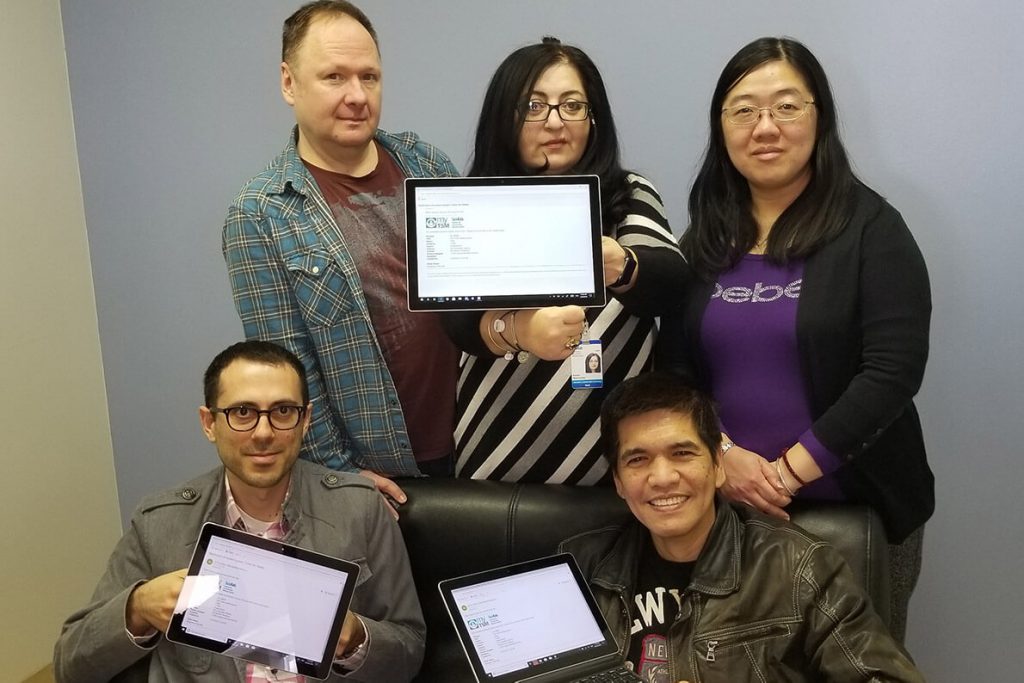
It was a productive year for the Information and Communication Technology (ICT) team as they made improvements to network security, with greater integration with SickKids technologies that provide enhancements to SickKids CCMH network threat prevention and detection, and endpoint security. These new and improved security features bolster the centre’s defenses against hacking, malware, and other malicious activity, protecting data and client privacy. Then, the ICT team worked with Human Resources and a project team at SickKids to launch a new best-in-class payroll system. The team rounded out their year facing a massive shift to virtual care in response to COVID-19, providing all staff with virtual access from home within hours of the physical closure of the SickKids CCMH sites on March 16. Working with their IT colleagues at SickKids, the team provided a PHIPA-compliant videoconferencing platform available to clinicians with which to conduct therapy sessions by the end of March.
Teaching future professionals through placement opportunities
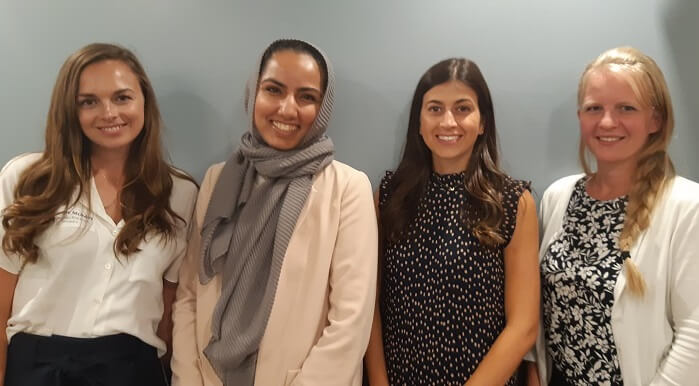
SickKids CCMH continues to grow as a training centre for a range of students and future professionals. This past year, they placed 121 learners from 16 colleges and universities across Ontario. These placements spanned nine disciplines, including social work, psychology, psychiatry, and early childhood education. SickKids CCMH continues to be responsive to the needs of the academic community, and this year, answered the need by adding a psychology assessment placement. Every one of the centre’s four program areas, as well as the Health Information Management and Human Resources team, took on students.
Not only does SickKids CCMH contribute to the academic experience of many students, but they in turn are an invaluable resource for SickKids CCMH clients. For example, this spring, placement students in psychology and psychiatry were wrapping up their year when COVID-19 closed the centre sites; the students continued client care by transitioning seamlessly to offering seminars and therapy through teleconferencing.
Safety upgrades at SickKids CCMH
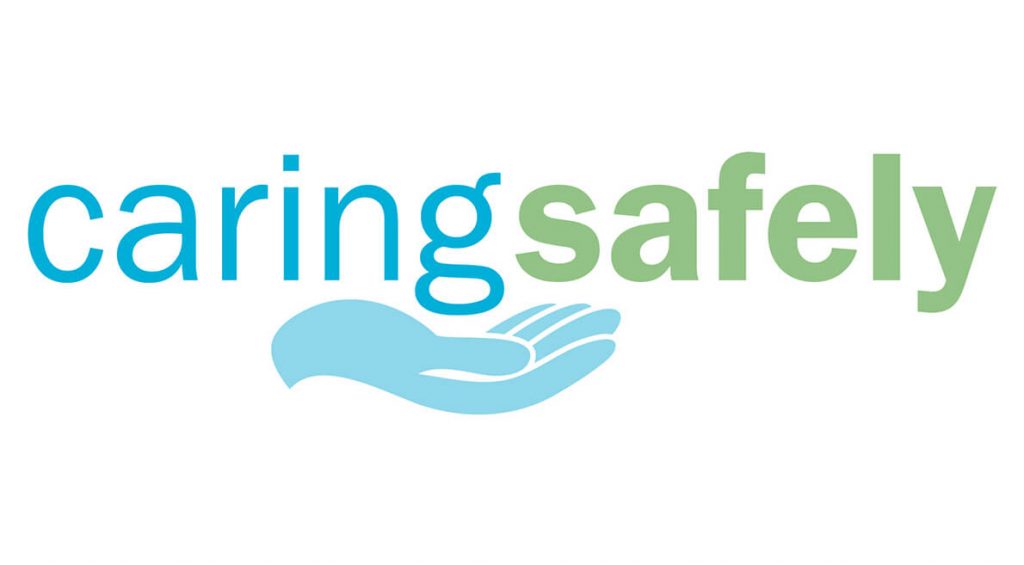
In the spring of 2019, SickKids CCMH launched Caring Safely, a client and staff safety initiative where staff and leaders work together to create a safe workplace. Through training and executive walkabouts, staff and students learned strategies to reduce harm. In the spring of 2020, the Infection Prevention and Control (IPAC) team created a Caring Safely “bundle” to educate staff on how committing to several related safety behaviours (such as handwashing, wearing a mask, and keeping physical distance) will reduce the risk of COVID-19 for staff and clients more than one behaviour alone.
Several building projects were completed this past year that had an impact on security and safety. These included a new roof and flooring at the Sheppard site, new lighting at the Jarvis site, and new furniture pieces (with surfaces that can be disinfected) in the treatment rooms at both sites, in the EarlyON centre and waiting area at the Sheppard site. Finally, the City of Toronto has installed traffic lights outside the Sheppard site, making it safer for families and staff to cross Sheppard Ave. W.



